Click on images to enlarge
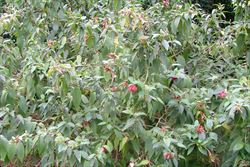
infestation (Photo: Sheldon Navie)

habit (Photo: Sheldon Navie)
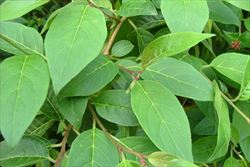
leaves (Photo: Sheldon Navie)
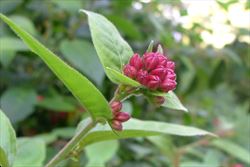
flower buds (Photo: Sheldon Navie)

flowers (Photo: Sheldon Navie)
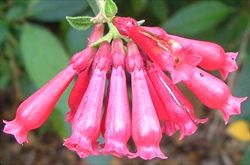
close-up of tubular flowers (Photo: Sheldon Navie)

mature fruit (Photo: Sheldon Navie)
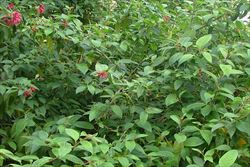
habit (Photo: Sheldon Navie)
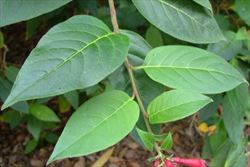
close-up of leaves (Photo: Sheldon Navie)
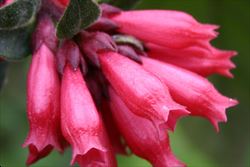
close-up of the flowers of the very similar plant Cestrum 'Newellii', a horticultural hybrid of Cestrum elegans and Cestrum fasciculatum, with hairy petal tubes (Photo: Trevor James)
Scientific Name
Cestrum elegans (Brongn. ex Neumann) Schltdl.
Synonyms
Habrothamus elegans Brongn. ex Neumann
Family
Solanaceae
Common Names
crimson cestrum, elegant poison-berry, purple cestrum, red cestrum
Origin
Native to
Naturalised Distribution
Naturalised mainly in Victoria, but also occasionally found in the coastal and sub-coastal districts of central and northern New South Wales and in south-eastern Queensland.
Notes
This shrub is a significant environmental weed in Victoria, where it is actively managed by community groups. It was also recently listed as a priority environmental weed in two Natural Resource Management regions.
Red cestrum (Cestrum elegans) invades disturbed rainforest margins, moist and wet sclerophyll forests, urban bushland and creek banks. In these situations in takes over and displaces indigenous shrubs and small trees and restricts the habitat of native wildlife. In New South Wales it has also escaped from gardens in the Wollongong district, in the Southern Highlands, and at Deervale on the north coast.
Note: Plants that are slightly hairy on the tubular parts of the petals are also present amongst naturalised populations. These plants originate from horticultural hybrids of Cestrum elegans and Cestrum fasciculatum, and are generally known as Cestrum 'Newellii' or Cestrum fasciculatum 'Newellii'.

